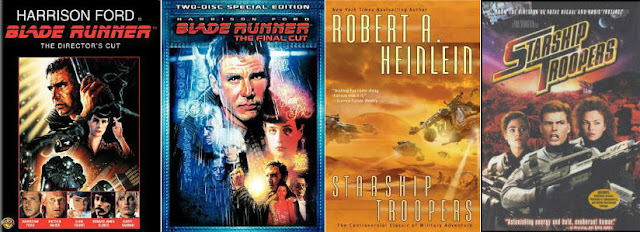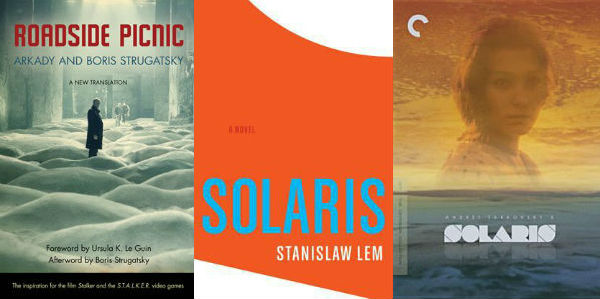The Book is Better than the Movie? The Science Fiction Edition
Whether you want to see the world of your imagination come to life, get through that second half of the story before your book discussion group meets tomorrow night, or simply see how someone else interpreted the novel, the film adaptation is here for you.
Emerging at the tail end of the 19th century, the film adaptation has brought one literary work after another to life, from classics like Oliver Twist, Moby Dick, and The Great Gatsby to more contemporary pieces of fiction such as The Silence of the Lambs, The Girl with the Dragon Tattoo, and the hyper-popular Harry Potter series. Movies based on books can do many great things—they can give an author a shot in the arm and reinvigorate the interest surrounding their work, introduce a new generation of readers to a piece of literature, or simply provide viewers with a quality piece of entertainment.
But there is also a dark side to the movie adaptation. Adaptations are sometimes labeled unfaithful to the author’s vision and scoffed at for cutting out entire sections of the original written work. Critics believe they discourage any possible future readers from enjoying the masterpiece that is the original piece of literature. This is the reason why some find it necessary to utter the phrase “the book is better than the movie.”
And so, although some bibliophiles may cry sacrilege while other movie buffs argue that “the movie is better than the book,” there is really no need to take such a polarizing stance when it comes to the whole book and movie adaptation. Instead, give both a try and see what one format can bring to the table that the other may leave behind.
April is a great month for science fiction. Sci-fi authors Anne McCaffrey, Terry Pratchett, Larry Niven and Katsuhiro Otomo all share the month for their birthdays. Amazing Stories, one of the earliest magazines dedicated solely to science fiction, released its first issue in April of 1926 and then its first digest issue in April of 1953. That issue contained works from famous science fiction authors Ray Bradbury and Robert Heinlein. Finally, a number of sci-fi classics like Flash Gordon, The Day of the Triffids, Godzilla, King of the Monsters! and 2001: A Space Odyssey hit the big screens all over the U.S. To celebrate April’s history of science fiction and explore the world of the movie adaptation, here is a list of a few science fiction novels and their motion picture counterparts. Some of these are well-known, while others may be considered obscure. Either way, these titles are all available through the Mercer County Library System for you to enjoy.
Do Androids Dream of Electric Sheep? by Phillip K. Dick
Blade Runner (1982)
Rick Deckard is an officially-sanctioned bounty hunter tasked to find six rogue androids. They are machines, but look, sound and think just like humans—clever and, most of all, dangerous humans.
Starship Troopers by Robert A. Heinlein
Starship Troopers (1997)
With Earth embroiled in a vast interplanetary war with the "Bugs," a young recruit in the Federal Reserves relates his experiences training in boot camp and as a junior officer in the Terran Mobile Infantry.
The Incredible Shrinking Man by Richard Matheson
The Incredible Shrinking Man (1957)
The Incredible Shrinking Woman (1981)
When Scott Carey encounters a mysterious radioactive mist on a boating trip, he soon finds his life taking on a bizarre and frightening twist. His physical size begins to diminish as he shrinks to a mere two inches. Suddenly, ordinary household situations loom over him with lethal intensity, a playful cat becomes a demon, and a spider is a gargantuan monster.
Roadside Picnic by Arkady and Boris Strugatsky
Stalker (1979)
Red Schuhart is a stalker, one of those young rebels who are compelled, in spite of the extreme danger, to venture illegally into the Zone to collect the mysterious artifacts that the alien visitors left scattered around. His life is dominated by the place and the thriving black market for the alien products. But when he and his friend Kirill go into the Zone together to pick up a “full empty,” something goes wrong. And the news he gets from his girlfriend upon his return makes it inevitable that he will keep going back to the Zone, again and again, until he finds the answer to all his problems.
Solaris by Stanisław Lem
Solaris (1972) (2002)
Ground control has been receiving strange transmissions from the three remaining residents of the Solaris space station. When cosmonaut and psychologist Kris Kelvin is sent to investigate, he experiences the strange phenomena that afflict the Solaris crew, sending him on a voyage into the darkest recesses of his own consciousness.
Akira by Katsuhiro Otomo
Akira (1988)
“In 2019, 31 years after World War III, the world has seemingly had a chance to return to normal. There are again high-school students, motorcycle gangs, corrupt Government officials and mystics who predict doom. ‘Under the guise of culture,’ says one, ‘we find desolation of the human heart.’”—The New York Times
Paprika by Yasutaka Tsutsui
Paprika (2006)
When prototype models of a device for entering into patients' dreams go missing at the Institute for Psychiatric Research, it transpires that someone is using them to manipulate people's dreams and drive them insane. Threatened both personally and professionally, brilliant psychotherapist Atsuko Chiba has to journey into the world of fantasy to fight her mysterious opponents. As she delves ever deeper into the imagination, the borderline between dream and reality becomes increasingly blurred, and nightmares begin to leak into the everyday realm. The scene is set for a final showdown between the dream detective and her enemies, with the subconscious as their battleground, and the future of the waking world at stake.
Perhaps you have read and watched some of these titles already—share your thoughts with us. Or maybe you have another movie/book pairing that you think everyone else should experience. Comment below and let us know what you are thinking.
Emerging at the tail end of the 19th century, the film adaptation has brought one literary work after another to life, from classics like Oliver Twist, Moby Dick, and The Great Gatsby to more contemporary pieces of fiction such as The Silence of the Lambs, The Girl with the Dragon Tattoo, and the hyper-popular Harry Potter series. Movies based on books can do many great things—they can give an author a shot in the arm and reinvigorate the interest surrounding their work, introduce a new generation of readers to a piece of literature, or simply provide viewers with a quality piece of entertainment.
But there is also a dark side to the movie adaptation. Adaptations are sometimes labeled unfaithful to the author’s vision and scoffed at for cutting out entire sections of the original written work. Critics believe they discourage any possible future readers from enjoying the masterpiece that is the original piece of literature. This is the reason why some find it necessary to utter the phrase “the book is better than the movie.”
And so, although some bibliophiles may cry sacrilege while other movie buffs argue that “the movie is better than the book,” there is really no need to take such a polarizing stance when it comes to the whole book and movie adaptation. Instead, give both a try and see what one format can bring to the table that the other may leave behind.
April is a great month for science fiction. Sci-fi authors Anne McCaffrey, Terry Pratchett, Larry Niven and Katsuhiro Otomo all share the month for their birthdays. Amazing Stories, one of the earliest magazines dedicated solely to science fiction, released its first issue in April of 1926 and then its first digest issue in April of 1953. That issue contained works from famous science fiction authors Ray Bradbury and Robert Heinlein. Finally, a number of sci-fi classics like Flash Gordon, The Day of the Triffids, Godzilla, King of the Monsters! and 2001: A Space Odyssey hit the big screens all over the U.S. To celebrate April’s history of science fiction and explore the world of the movie adaptation, here is a list of a few science fiction novels and their motion picture counterparts. Some of these are well-known, while others may be considered obscure. Either way, these titles are all available through the Mercer County Library System for you to enjoy.
Do Androids Dream of Electric Sheep? by Phillip K. Dick
Blade Runner (1982)
Rick Deckard is an officially-sanctioned bounty hunter tasked to find six rogue androids. They are machines, but look, sound and think just like humans—clever and, most of all, dangerous humans.
Starship Troopers by Robert A. Heinlein
Starship Troopers (1997)
With Earth embroiled in a vast interplanetary war with the "Bugs," a young recruit in the Federal Reserves relates his experiences training in boot camp and as a junior officer in the Terran Mobile Infantry.
The Incredible Shrinking Man by Richard Matheson
The Incredible Shrinking Man (1957)
The Incredible Shrinking Woman (1981)
When Scott Carey encounters a mysterious radioactive mist on a boating trip, he soon finds his life taking on a bizarre and frightening twist. His physical size begins to diminish as he shrinks to a mere two inches. Suddenly, ordinary household situations loom over him with lethal intensity, a playful cat becomes a demon, and a spider is a gargantuan monster.
Roadside Picnic by Arkady and Boris Strugatsky
Stalker (1979)
Red Schuhart is a stalker, one of those young rebels who are compelled, in spite of the extreme danger, to venture illegally into the Zone to collect the mysterious artifacts that the alien visitors left scattered around. His life is dominated by the place and the thriving black market for the alien products. But when he and his friend Kirill go into the Zone together to pick up a “full empty,” something goes wrong. And the news he gets from his girlfriend upon his return makes it inevitable that he will keep going back to the Zone, again and again, until he finds the answer to all his problems.
Solaris by Stanisław Lem
Solaris (1972) (2002)
Ground control has been receiving strange transmissions from the three remaining residents of the Solaris space station. When cosmonaut and psychologist Kris Kelvin is sent to investigate, he experiences the strange phenomena that afflict the Solaris crew, sending him on a voyage into the darkest recesses of his own consciousness.
Akira by Katsuhiro Otomo
Akira (1988)
“In 2019, 31 years after World War III, the world has seemingly had a chance to return to normal. There are again high-school students, motorcycle gangs, corrupt Government officials and mystics who predict doom. ‘Under the guise of culture,’ says one, ‘we find desolation of the human heart.’”—The New York Times
Paprika by Yasutaka Tsutsui
Paprika (2006)
When prototype models of a device for entering into patients' dreams go missing at the Institute for Psychiatric Research, it transpires that someone is using them to manipulate people's dreams and drive them insane. Threatened both personally and professionally, brilliant psychotherapist Atsuko Chiba has to journey into the world of fantasy to fight her mysterious opponents. As she delves ever deeper into the imagination, the borderline between dream and reality becomes increasingly blurred, and nightmares begin to leak into the everyday realm. The scene is set for a final showdown between the dream detective and her enemies, with the subconscious as their battleground, and the future of the waking world at stake.
Perhaps you have read and watched some of these titles already—share your thoughts with us. Or maybe you have another movie/book pairing that you think everyone else should experience. Comment below and let us know what you are thinking.
—Christopher Yaple




Comments
Post a Comment